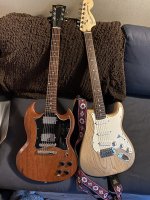Thanks for this! I'm hoping to actually learn my way around the fretboard and actually play the guitar, rather than just aping tablature.
If I can be bold enough to offer another suggestion....
Obviously everyone will think of scales in the sense of soloing (especially the "blues scale"/pentatonic). But learning them is important for coming up with interesting melodies and playing with triads/dyads. Often triads/dyads are more powerful and expressive, IMO, than any chord because they allow you to weave together melodies into the complexities and full bodiness of chords.
So, I don't know how you thought of scales before; for me, when I first started playing it was all pentatonic. Then when I was 15 or so I was fortunate enough to have a teacher show me Classical modes (Ionian [Root], Dorian, Phyrgian, Lydian, Mixolydian, Aeolian [Natural Minor], and Locrian).
They totally open up any particular key and allow you to dance around the notes. I know I just named a bunch of Greek words, but once their relationship clicks it becomes clear (also forgive me if you are already familiar with any or all of this - if you are, I don't mean to patronize).
Understanding the relationship between a Major root and it Natural minor is an early step. Also developing an ear for where you hear your favorite artists using these modes:
Dorian - Santana used it a lot
Lydian - jazz - the augmented fourth is fundamental
Mixolyidan - a lot of your jam bands - gives a melodic yet bluesy sound (e.g. Grateful Dead, Allman Bros)
Locrian - the diminished fifth is like a strong spice; can be used delicately to create dissonance, tension, and to tease an unresolved melody (our ears are trained to hate that, but the threat of it can sound exciting); actually see Bjork's Army of Me for a rare modern song using it
TL;DR I guess what I'm saying is music theory is important
